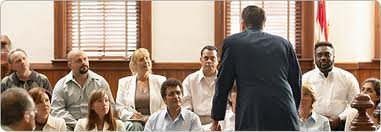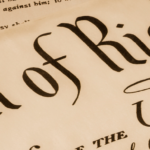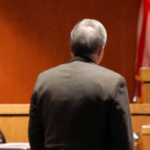The Jury Trial is the Most Complex Hearing in a Criminal Prosecution
Few criminal defense lawyers are routinely successful in their jury trials. The most successful trial lawyers have a team providing backup and a desire to fight fearlessly!

Lawyers Who Routinely Win are Rare
Jury trials require preparation, skill, a little luck, and stamina. A top criminal defense attorney must be prepared for the expected and the unexpected. A great trial lawyer will be able to handle anything that develops. If you are asking, “What Happens During a Jury Trial?” the jury trial lawyers with LEWIS & DICKSTEIN, P.L.L.C. can answer all your questions.
Start of Jury Trial
What happens during a jury trial? The start of a trial starts with picking a jury. The jury selection process is often called “voir dire” or to tell the truth. The process of selecting a jury is critically important as these are the people who will decide the facts of the case.
Once the potential jurors are brought into the courtroom, they are told about the charges and asked preliminary questions. The potential jurors are given an oath, and then a set number of jurors are asked to sit in the jury box. The judge first questions the jurors in the jury box. In most courts, the jurors are then questioned by the prosecutor and then lastly by the Criminal Defense Trial Attorney. During the initial questioning by the parties, each side can request that a juror be removed “for cause.” A “for cause” removal is based on an apparent bias or an argument that the juror is not fit to be a juror.
Once jurors are “passed for cause,” each side can strike a set number of jurors for no reason (called a peremptory challenge). A jury is formed once the prosecution and defense are out of challenges. The jurors are sworn to follow the rules of being a juror, and the case is set to begin.
After the jury is selected, the judge instructs the jury on the law. This is frequently called preliminary instructions.
Opening Statements – The Start of Battle
After instructions, each side is allowed to make an opening statement. Opening statements are a road map for the jury about what each side believes the evidence will show. Opening statements are not evidence.

Testimony and Evidence are Introduced
After opening statements, the prosecution presents its case, usually by witnesses, police officers, evidence technicians, and experts. Each case is different, and not all cases have the same number of witnesses. The defense has the opportunity to cross-examine the prosecution witnesses. The defense lawyer’s skill and tenacity frequently make the difference in breaking the prosecution’s case with tough cross-examination.
After the prosecution presents its case, the defense goes next. The Defense is not required to offer any evidence. The defense has no burden and, with the presumption of innocence, is entitled to a verdict of “not guilty” if the prosecution has not proven its case beyond a reasonable doubt. If the Defense does present a case, it does so by admitting evidence through witnesses, experts, and the defendant’s testimony if they choose to testify.
Once the defense is finished presenting its case, the prosecution may call witnesses to rebut the defense. Once that is complete, the evidence is concluded. This is one of the final steps in what happens during a jury trial.
Closing Arguments – The Final Battle
After the presentation of evidence concludes, it is time for closing arguments. Like opening statements, closing arguments are not evidence. Closing arguments are when each party argues what inferences can be made regarding the evidence. The prosecution makes the first closing argument, followed by the defense. After the defense attorney makes its closing argument, the prosecution has one final closing argument since it has the burden of proof.
In a criminal trial, the prosecution must prove, beyond a reasonable doubt, that the defendant committed the crime. Defendants without a criminal history often wonder what happens during a jury trial when deciding whether to take a case to trial.
After each side completes closing arguments, the court will again instruct the jury on the law. The instructions after the close of proofs are called “closing instructions.” The jury instructions are the law the jurors must follow when examining the evidence.
After the final jury instructions, the jury is taken to the jury room for deliberations. Once they reach a verdict, they notify the bailiff. The judge calls the parties into the courtroom, and the jury returns the verdict.

Jury Trial Victory – “Not Guilty!”
If the case goes the right way, there is a two-word verdict…“Not Guilty!”
Jury trials are complex. They are nothing like those that are portrayed on television. Picking the jury takes anywhere from half a day to a week, depending on the type of case. An experienced criminal defense attorney is critically important because of the unexpected things that invariably happen during any jury trial.
In the crucible of a jury trial, where your freedom and future hang in the balance, having a seasoned trial lawyer by your side is not just an advantage—it’s necessary. At LEWIS & DICKSTEIN, P.L.L.C., our unparalleled expertise and relentless advocacy have established us as the go-to firm for those wrongfully accused and needing a formidable defense in Michigan. Our team of dedicated criminal defense lawyers understands the intricacies of jury trials, ensuring that every facet of your case is meticulously prepared and presented with the utmost precision and persuasive power. When the stakes are highest, trust LEWIS & DICKSTEIN, P.L.L.C. to champion your cause and protect your rights. We will leverage our comprehensive legal knowledge and trial prowess to fight for the best possible outcome. For anyone searching for a top trial lawyer capable of navigating the complexities of the courtroom and securing justice, look no further—our track record speaks volumes, and we’re ready to add your victory to our legacy of success.
Call us today at (248) 263-6800 for a free consultation or complete an online Request for Assistance Form. We will contact you promptly and find a way to help you.












